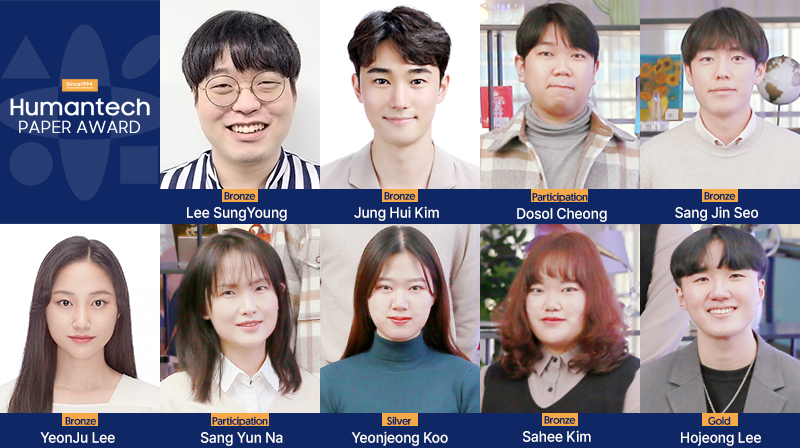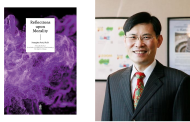Nine UNIST students have been recognized for their excellence in academic and research work at the 28th Annual Samsung Humantech Paper Award ceremony.
UNIST, having already established itself as a leading institute in science and technology, once again took center stage at the 2022 Samsung Humantech Paper Award by claiming 1 Gold, 1 Silver, 5 Bronze, and 2 Participation Awards.
Among the many eminent individuals, Ho Jeong Lee (Advisor: Professor Youngkook Kwon) notched the highest score and won the Gold Prize within the category of Energy & Environment. This award has been bestowed upon Ho Jeong Lee in recognition of her latest research on the development of the world’s most efficient electrochemical catalyst (82.4%) that can produce ethylene using carbon dioxide (CO2).
Ethylene, a key raw material in the petrochemical industry, generates enormous amounts of greenhouse gas (GHG) emissions because it undergoes a high-pressure, high-temperature process. On the other hand, CO2 conversion technology using electrochemical catalyst technology is expected to be a core technology for eco-friendly processes, related to sustainable and renewable energies. Ho Jeong Lee plans on commercializing this technology with further research.

Recipients of the 2022 Samsung Humantech Paper Awards. From top left are Dosol Cheong, Sang Jin Seo, Sahee Kim. From bottom left are Sang Yun Na, YeongJeong Koo, and Ho Jeong Lee.
At the awards ceremony, YeongJeong Koo (Advisor: Professor Kyoung-Duck Park) in the Department of Physics was given the Silver Award within the category of Basic Science. In addition to this, 5 meritorious students have been bestowed with the Bronze Awards. These recipients include Sang Jin Seo (Advisor: Professor Taesung Kim), Sahee Kim (Advisor: Professor Jiyoung Park), Jung Hui Kim (Advisor: Professor Sang Yong Lee), Sungyong Lee (Advisor: Professor Kyunghan Lee), and Yeonju Lee (Advisor: Professor Hyeon Suk Shin). Besides, Dosol Cheong (Advisor: Professor Hyun-Kon Song) and Sang Yun Na (Advisor: Professor Hyunhyub Ko) have been presented with the Participation Awards.
Established in 1994, this competition recognizes an elite cadre of creative young researchers who through competition have demonstrated excellence in research. Approximately 1,500 papers are submitted each year, yet only a small percentage of papers are selected for the prestigious prize.






![[2026 UNIST Matriculation] “Design Questions the World Has Never Seen!”](https://news.unist.ac.kr/wp-content/uploads/2026/02/사진-박종래-UNIST-총장이-2026년-입학식사를-전하고-있다-1-1-190x122.jpg)
![[2026 UNIST Commencement] “Become Way Makers Who Open Paths Where None Are Drawn!”](https://news.unist.ac.kr/wp-content/uploads/2026/02/사진-박종래-총장이-UNIST-학위수여식사를-전하고-있다-3-1-190x122.jpg)
![[2026 UNIST Commencement] Voices of Class of 2026](https://news.unist.ac.kr/wp-content/uploads/2026/02/Untitled1-190x122.jpg)



